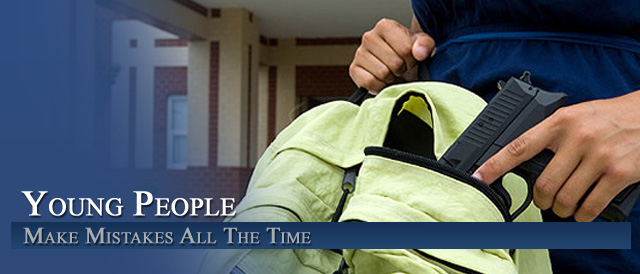
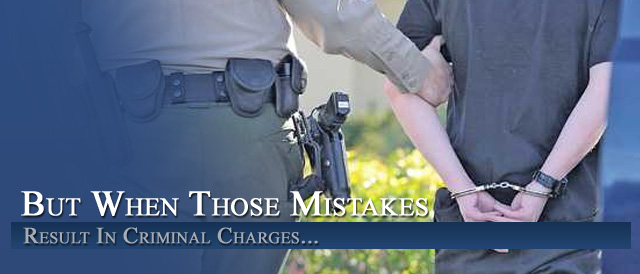
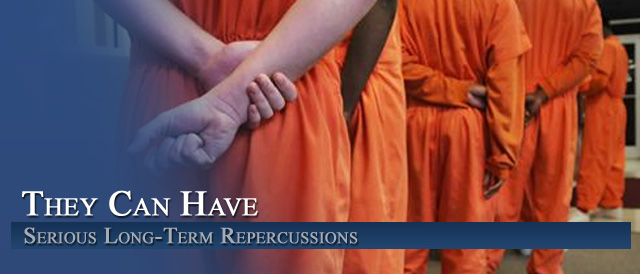
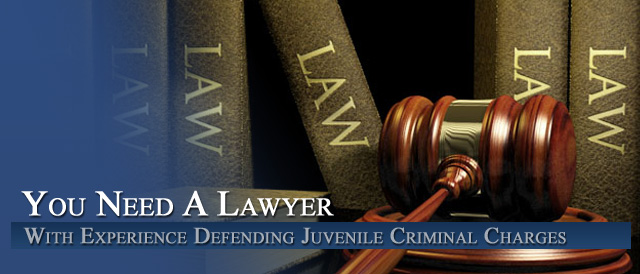
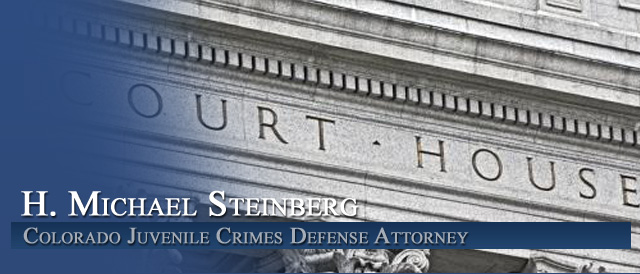
Why You Should Hire A Lawyer In A Juvenile Criminal Case At The Investigation Stage
By H. Michael Steinberg – Colorado Criminal Juvenile Crimes Defense Lawyer – Attorney – Email The Author
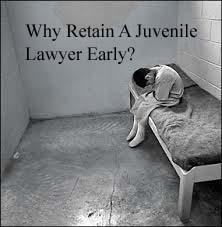 Why You Should Hire A Lawyer In A Juvenile Criminal Case At The Investigation Stage – Early intervention in a Colorado juvenile criminal case makes sense from many perspectives. The kind of fears generated in the minds of parents by an “investigation” of your child by the police or social services can literally impact your mental health at severla levels.
Why You Should Hire A Lawyer In A Juvenile Criminal Case At The Investigation Stage – Early intervention in a Colorado juvenile criminal case makes sense from many perspectives. The kind of fears generated in the minds of parents by an “investigation” of your child by the police or social services can literally impact your mental health at severla levels.
How You Know Your Child Is In Trouble – Entry Of The Colorado Juvenile Criminal Defense Lawyer
The method a Colorado Juvenile Criminal Defense Lawyer (LINK) becomes involved in your child’s case is:
1. The lawyer receives a phone call from a parent or other relative of the child, – the child was just arrested and is presently on the way to the police station or is already at the police HQ.
2. The lawyer is actually contacted by the child him or herself, the child’s parent or other relative after the arrest, but prior to the booking or intake process and has the chance to represent the child during intake.
3. The lawyer receives a phone call from a client who is “under investigation” or “wanted” by the police for a crime – but has not yet been arrested.
4. The lawyer is retained by the family for other reasons including the child is already in the court system and the parents have become overwhelmed by the system or the child has “run” failed to appear for a court hearing, or has even escaped from a juvenile detention facility.
The specific steps that a lawyer must take in each situation to protect his or her client’s rights are as different as the scenarios themselves.
When A Colorado Juvenile Criminal Defense Lawyer Enters The Case – The Need to Move Quickly
In each of the scenarios described above – the lawyer needs to move quickly and intelligently. Delaying – for example – if the child is already being interrogated at the child’s school, o the street or at the police station – can result in the child’s “succumbing” to police pressure and actually confessing toa serious crime before the lawyer can reach the station and prevent the confession.
In every scenario – preparation and research of the individual case is critical and should be as thorough as practicable
Hire A LOCAL Juvenile Criminal Defense Lawyer Who Is Familiar With The LOCAL Courts
No only must the lawyer know the case and the client – the lawyer must be aware of the local court’s practices, who the District Attorney’s are, and which of the police departments can be trusted and which cannot. Understanding local procedures, practices and functionaries may mean the difference between a wise choice and a foolish one.
Obviously there is a “trade-off” between time-consuming preparation and the tactical advantage of getting a quick start – to prevent the juvenile’s interests from being irreparably damaged by fast-breaking events.
If The Police Are About To Make An Arrest – Or An Arrest Warrant Has Issued – What Are The Important Steps To Take if a Client Is Wanted by the Police
Unfortunately most criminal defense lawyers are not retained until the child is in court at the initial Detention Hearing.
If a juvenile’s parent can afford to retain counsel, the parent and client should definitely retain a Colorado criminal defene lawyer PRIOR to the advisement hearing.
The ARREST of A Juvenile – Taking The Child Into Custody
The arrest of a child – the taking of the child into custody- is similar to that of the arrest of adult criminal defendants.
The arrest is either:
1. Pursuant to an arrest warrant issued by a judge or magistrate on the basis of an affidavit establishing probable cause to believe that the child committed a delinquent offense; or
2. Without a warrant, on the officer’s own determination that s/he possesses facts making out probable cause to believe that an offense was committed and that this particular juvenile is the perpetrator (or aider and abettor in the perpetration) of the offense.
The majority of cases do not involve arrest warrants – the vast majority of juveniles are arrested at or near the scene of a crime shortly after its commission, or they receive a summons in the mail setting a court date for a formal advisement of the charges.
Police Practices Following Arrest – The Colorado Juvenile Detention Center
If there is an arrest, the alleged “delinquent child” is generally taken immediately to the police station or to the local detention center.
Colorado Juvenile Detention Centers
Some Issues To Help You Make This Important Decision
Whether the arresting officer involved is a juvenile case agent or just an ordinary patrol officer, the decision on whether to question the child is made and notification of the parents – if there is going to be questioning of the child while the child is “in custody” is required under Colorado law.
The purposes of the interrogation always remains the same:
1. To obtain the juvenile’s admission or confession to the offense for which s/he was arrested,
2. To obtain the juvenile’s implication of other persons involved in the offense, and
3. To obtain the juvenile’s admission or confession of other “uncleared” or “open” offenses that s/he may have committed.
Line or Show-Ups
The juvenile may be subjected to other “investigative procedures” before or immediately after booking such as a lineup or show-up.
Re-enactments Of The Crime
The officer may take the juvenile back to the “scene of the crime” to “reenact” or demonstrate what happened.
Searches For Other Evidence
The child may also just be taken home or elsewhere to assist the police in finding critical evidence in the case such as secreted or discarded weapons, loot, or other evidence related to the investigation and there may be a request by the police to permit or “consent” to a warrantless search… which cannot occur without a search warrant.
Seizing CSI Evidence
The police may attempt to obtain specimens of the juvenile’s hair or blood, swabs, washes, or body scrapings may be taken for laboratory analysis.
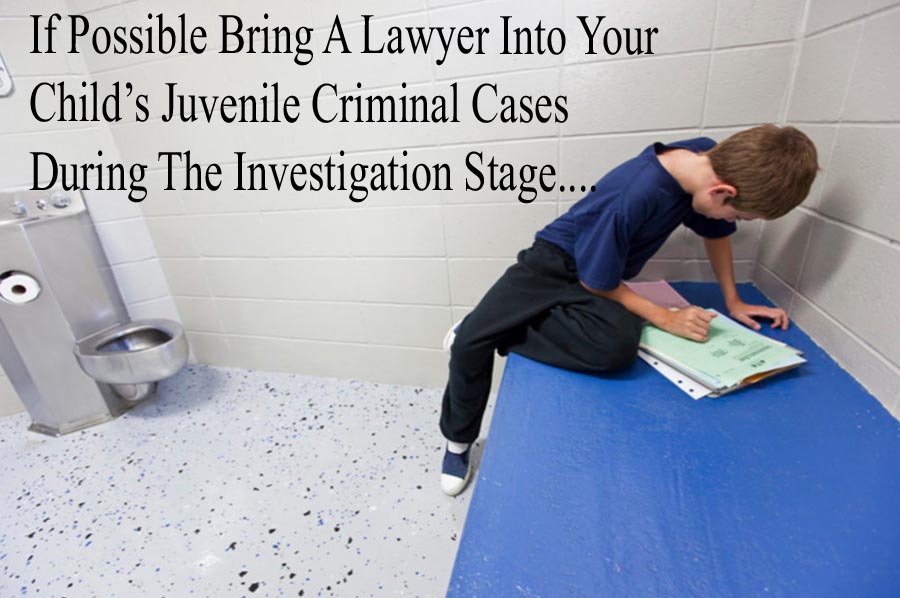 Why You Should Hire A Lawyer In A Juvenile Criminal Case At The Investigation Stage
Why You Should Hire A Lawyer In A Juvenile Criminal Case At The Investigation Stage
Each of these police procedures listed above may develop incriminating evidence against your son or daughter. A lawyer can insert themselves between the police and your child. What is the value of that defenses – well it may stop your child from being subjected to at least some if not all of these procedures and may prevent others from ever occurring.
Rights can be waived — and they often are waived unless counsel takes adequate steps to insure their protection.
Police Exercise of Discretion Whether to Charge the Respondent
Colorado police have broad discretion to “divert” juvenile cases from the system by simply dropping the charges with a warning or, in some jurisdictions, by referring the child to a local social services agency or – by working with the DA – prevent the case from ever coming to court.
The “informal diversion programs” are offered or rejected as solutions based on several factors such as:
1. the seriousness of the offense.
2. the age of the child.
3. the child’s prior record of convictions, charges, and prior contacts with the police.
4. the demeanor of the child (kids who seem respectful to the officers and fearful of sanctions viewed as “salvageable” and therefore may actually be diverted from the system).
5. the comments and attitude of the parents upon being informed of the child’s arrest (with the officer assessing whether the parents are likely to appropriately punish the child and control his or her misbehavior in the future).
6. the individual officer’s personal feelings about the juvenile justice system and the likelihood that a minor offender will derive any benefits from court intervention.
Sometimes the police departments will only record a record call a “contact card” with reference to dropped or diverted cases and these records are often consulted when the police make the decision to file or not file on a newly arrested child.
Good luck – call my firm if you need guidance.. H. Michael Steinberg
Why You Should Hire A Lawyer In A Juvenile Criminal Case At The Investigation Stage
ABOUT THE AUTHOR: H. Michael Steinberg – A Denver Colorado Juvenile Crimes Criminal Defense Lawyer – or call his office at 303-627-7777 during business hours – or call his cell if you cannot wait and need his immediate assistance – 720-220-2277.
If you are charged with A Colorado crime or you have questions about Why You Should Hire A Lawyer In A Juvenile Criminal Case At The Investigation Stage, please call our office. The Law Offices of H. Michael Steinberg, in Denver, Colorado, provide criminal defense clients with effective, efficient, intelligent and strong legal advocacy. We can educate you and help you navigate the stressful and complex legal process related to your criminal defense issue.
H. Michael Steinberg, is a Denver, Colorado criminal defense lawyer with over 40 years of day to day courtroom experience – specializing in Colorado Criminal Law along the Front Range. He will provide you with a free initial case consultation to evaluate your legal issues and to answer your questions with an honest assessment of your options. Remember, it costs NOTHING to discuss your case. Call now for an immediate free phone consultation.
Helping Clients To Make Informed Decisions In the Defense of Colorado Criminal Cases.
Contact A Lawyer with Three Decades of Experience as a Denver Criminal Attorney at The Steinberg Colorado Criminal Defense Law Firm Today.
Colorado Defense Lawyer H. Michael Steinberg provides solid criminal defense for clients throughout the Front Range of Colorado – including the City and County courts of Adams County, Arapahoe County, City and County of Boulder, City and County of Broomfield, City and County of Denver, Douglas County, El Paso County – Colorado Springs, Gilpin County, Jefferson County, Larimer County, and Weld County,…. and all the other cities and counties of Colorado along the I-25 Corridor… on cases involving … Why You Should Hire A Lawyer In A Juvenile Criminal Case At The Investigation Stage.
Other Articles of Interest:
- Colorado Juvenile Criminal Process – The Adjudication Process
- Colorado Juvenile Criminal Process – The Pre-sentence Investigation
- The Colorado Juvenile Pre-Sentence Investigation
- Presentence Investigation 19-2-905
- Birdseye Statutory View – Colorado Juvenile Criminal System












